Speakers


Professor David McWilliams
Professor of Critical Care and Rehabilitation , Centre for Care Excellence, University Hospitals Coventry & Warwickshire NHS Trust



11.05am – 12pm BST, 1 July 2025 ‐ 55 mins
Plenary
This session showcases the newly published NCEPOD study evaluating rehabilitation and recovery following critical illness. It will explore the key findings and recommendations, with views from a patient perspective of trying to rebuild life after a critical care stay. We will also explore lessons learned from guidance in other areas and how the ICS and National rehabilitation collaborative can support clinicians to make real change to improve rehabilitation provision.
Learning objectives
Chairperson: Kate Tantam
David McWilliams - NCEPOD – Findings and recommendations
Lizzi Jordan - Starting again, the reality of surviving critical illness
Katie Nurcombe - A call to action


Professor of Critical Care and Rehabilitation , Centre for Care Excellence, University Hospitals Coventry & Warwickshire NHS Trust




Specialist Intensive Care Sister, UK
Kate is a Specialist Sister in ICU in Plymouth. Her role is to support patients, loved ones and staff pre and post ICU discharge. She is a nurse researcher in rehabilitation after critical illness and the founder of the #Rehablegend campaign. The campaign shares patient stories to share best practice, improve patient experience, support quality improvement and clinical research and raise awareness of the importance of rehabilitation for all. Her work was recognised with a Parliamentary Award for care and compassion in 2019, National Patient Experience Award in 2019. Her work during 2020/2021 supporting patients with COVID saw her awarded with a British Empire Medal for services to improve patient experience. She is the deputy chair of the National Rehabilitation Collaborative and is keen to develop national work to support recovery after ICU.

Professor of Critical Care and Rehabilitation , Centre for Care Excellence, University Hospitals Coventry & Warwickshire NHS Trust
David McWilliams is a Professor of Critical Care and Rehabilitation and Clinical Academic Physiotherapist at University Hospitals Coventry and Warwickshire NHS Trust and Coventry University's Centre for Care Excellence. He is the chair of the physiotherapy working group for the European Society of Intensive Care Medicine, and Chair of the Intensive Care Society National Rehabilitation Collaborative. David was a member of the guideline development group for the NICE guideline ‘Critical Illness rehabilitation’ and led an NCEPOD study into rehabilitation and recovery following critical illness. David is recognised as an international expert on critical care physiotherapy and rehabilitation, regularly presenting both nationally and internationally on the subject.

Consultant Intensivist , UK
Dr Zudin Puthucheary is a Clinical Senior Lecturer in Intensive Care Medicine at the William Harvey Institute, Queen Mary, University of London, and a Consultant at the Royal London Hospital Adult Intensive Care Unit. He graduated from Nottingham University in 1997, and moved to London post MRCP in 2000. Following a 3-year stint in Sydney, he started his Respiratory training in Bristol, before completing his critical care training in London. He worked as a Respiratory and Critical Care Consultant at National University Hospital Singapore before returning to the UK.
His research focusses on acquired functional disability, and the use of metabolic, nutritional and exercise interventions to prevent and treat muscle wasting, and has published over 100 papers with a H index of 39. Zudin is a nationally elected Council member of the Intensive Care Society (UK). He was the inaugural chair of the UK National Post-Intensive Care Rehabilitation Collaborative, a multi-professional cross-disciplinary group focussing on rehabilitation and restitution of critical illness survivors. His work on acute muscle wasting has won awards from the European Society of Intensive Care Medicine , European Society of Anesthesia, the British Thoracic Society, the Intensive Care Society, The American Society of Enteral and Parenteral Nutrition and Zudin was named a Global Rising Star by the Australia and New Zealand Intensive Care Society.
He chairs the UK National Post-Intensive Care Rehabilitation Collaborative, a multi-professional cross-disciplinary group focussing on rehabilitation and restitution of critical illness survivors.
:
@Zudin_P

Paralympian
Lizzi Jordan was a fit, able bodied 19-year-old when she was diagnosed with haemolytic uraemic syndrome, with myopericarditis and cardiogenic shock as a result of E.coli food poisoning. Her 12-week ICU hospital stay consisted of an 8-week coma and was transferred between 3 separate London hospitals for specialist care. She was so ill that St Bart’s placed her on ECMO. In 2017, the team were still finding their way with this complex therapy but surprisingly to her clinical team, Lizzi did well and after 11 days they transferred her back to UCH for rehab and review. Unfortunately, due to complications from HUS during her coma, Lizzi awoke to discover she had totally lost her eyesight. Rehab after such illness was difficult and coupled with her newly acquired life-changing disability, the coming months were difficult to say the least. Lizzi had to relearn how to walk and navigate her new life without her eyesight. Her determination and perseverance to make the most of her life, that she so nearly lost, was evident as 6 months after discharge she took up running with her Dad as her sighted guide. 14 months later she ran the London Marathon raising over £11,000 for RNIB. Turning to sport to save her, she then attended a Talent ID day with British Cycling who were looking for a visually impaired athlete to ride a tandem. Fast forward 4 years and Lizzi is now a Triple World Champion and Won her first Paralympic Gold in Paris 2024. Her clinical team are still in awe at what she has been able to achieve considering how slim her chances of survival were. She was recognised in the King’s 2025 New Year Honours and appointed MBE.

Chief Executive Officer, Intensive Care Society
Katie has a wealth of experience leading membership growth and transformational change. Over her career she has led trade associations, membership organisations and public-private partnerships, and has worked in a variety of sectors including local growth, construction, skills and healthcare. Most recently she was CEO at ENT UK, the surgical association for Ear, Nose, Throat and Head and Neck surgeons. She has a passion for corporate social responsibility, and is an active champion of wellbeing as well as equity, diversity and inclusion.